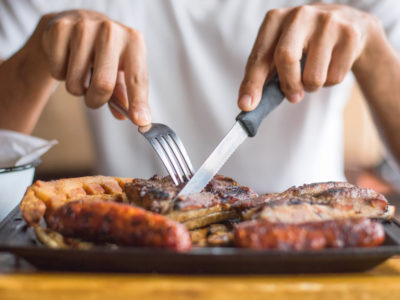Table of Contents[Hide][Show]
- What is a Raw Food Diet?
- Raw Food vs. Cooked Food
The Health Risks of a Raw Food Diet+−
- Could Make You Underweight
- Absence of Menstrual Periods for Women
- Increased Risk of Food-Borne Illnesses
- Higher Risk of Nutritional Deficiencies
- May Weaken Your Bones and Muscles
- Is a Raw Food Diet Healthy or Unhealthy?
- 10 Advantages of Buying Local
- Can Too Much Protein Cause Inflammation?
- What Is Ellagic Acid? 10 Foods That Contain Ellagic Acid
People have been constructing raw food diets since the 1800s. However, it’s only recently become a popular diet option for the masses.
In fact, advocates and supporters of raw food nutrition believe that this diet offers huge benefits to consumers, especially when it comes to weight loss.
Some experts disagree with the idea of consuming mostly raw foods, and argue that it can lead to both minor and major health risks in the long run.
See below for a deep-dive into the raw food diet, its health benefits, and its risks.
What is a Raw Food Diet?
The raw food diet, also called raw veganism or raw foodism, is a kind of diet composed of mostly unprocessed and raw foods.
This diet started in the 1800s when doctor Maximilian Bircher-Benner used raw apples to heal his jaundice.
After successfully reversing his symptoms, he began a series of experiments to discover the health benefits of eating only raw foods. Thus, the raw food diet was born.
This diet involves eating foods that have never been heated over 40–48 °C and are not processed, cooked, irradiated, or microwaved.
When cooked, food is often stripped of the natural enzymes that are helpful in the digestion of vital nutrients for good health.
To combat this, raw foodists prepare their foods using blending, soaking, sprouting, juicing, dehydrating, and fermenting techniques.
Raw Food vs. Cooked Food
Raw foodists believe that the raw food diet is the most ideal for human health compared to eating cooked meals. However, limited studies and research exist to back up these claims.
They believe that high heat can cause the enzymes to change in shape or nature.
Similarly, they also agree that cooking decreases and destroys specific nutrients in food including vitamin C, vitamin B, and other water-soluble nutrients.
While this is true, cooking also offers huge health benefits.
First, cooking boosts the availability of other antioxidants and nutrients in some foods, for example, beta-carotene and lycopene.
Cooking also helps deactivate harmful microorganisms and bacteria in foods that may cause food-borne illnesses. Examples of these foods are lettuce, tomatoes, spinach, and raw sprouts, which are most frequently contaminated by bacteria.
Raw dairy, eggs, meat, and fish can also be contaminated with listeria, E. coli, salmonella, and campylobacter, all of which can make you sick. Thus, cooking is important—though it’s understood that eating a raw food diet typically means excluding most animal-based foods.
All of this being said, science does not disagree with the fact that both raw and cooked foods have their own benefits. Many experts therefore recommend eating a balanced, healthy diet made up of both.
Raw Foods to Eat on a Raw Food Diet
Curious about what foods to eat if you’re going on a raw food diet?
There are actually plenty of food options to choose from and several guidelines to follow to ensure you’re eating healthy raw foods.
First, a point of clarification: You are considered a raw foodist if your diet consists of 75% raw food. Remember, these foods are not…
- Heated above 110° F.
- Processed, refined, or pasteurized
- Treated with pesticides
- Caffeinated
Instead, you should be eating…
- High-quality, whole, unprocessed foods
- Organic vegetables, nuts, and fruits
- Germinated and sprouted grains and beans
- Recipes prepared from raw ingredients
Below are some food options and sources that you may want to consider adding to your diet if you choose a raw foods approach.
Fats
- Chia oil
- Raw flaxseed oil
- Extra-virgin olive oil
- Raw coconut oil
- Avocados
- Raw hemp seed oil
Grains (sprouted and germinated)
- Buckwheat groats
- Quinoa
- Wild rice
- Kamut
- Spelt
- Millet
- Wheat germ
Legumes and Beans
- Adzuki beans
- Lentils
- Mung beans
- Chickpeas
Fermented Foods
- Yogurt (unpasteurized)
- Miso paste
- Coconut kefir
- Sauerkraut
Related
Considering a vegan or vegetarian diet? Learn how to support your gut health with vegan probiotics.
9 Best Vegan Probiotics For Gut Health
If you do not consume dairy, here are some vegan probiotic foods that are are fantastic when it comes to taking care of your gut health.
Beverages
- Purified water
- Freshly squeezed, unpasteurized fruits and vegetables
- Barley grass juice
- Wheatgrass juice
- Young coconut water
Sweeteners
- Yacon syrup
- Coconut nectar
- Mesquite powder
- Date sugar
- Raw honey
- Stevia powder
- Raw agave nectar
Herbs, Spices, and More
- Celtic sea salt
- Himalayan salt
- Apple cider vinegar
- Cayenne peppers
- Ground cinnamon
- Curries
- Dill
- Ginger root
- Parsley
- Raw vanilla beans
- Vinegar
The Health Benefits of a Raw Food Diet
Since the raw food diet includes nutrient-rich plant foods, proponents believe that it offers important health benefits.
Below are some benefits of eating a raw food diet.
Helps with Weight Loss
Raw food is rich in fiber and low in calories and carbohydrates. High-fiber foods not only provide helpful GI support, but they also take longer to digest (making you feel full longer). This combination of fewer cravings and lower calories and carbs results in more weight loss over time.
In fact, several studies show that eating a raw food diet helps people lose a significant amount of body fat quickly and keep the weight off.
In one study published in the journal of Annals of Nutrition and Metabolism, people who ate a raw food diet lost 22- 27 pounds of body fat over 3 years.
Compared to those eating a more typical American diet, raw foodists have 7- 9.4% lower body fat. This means they are slimmer than the average American.
Boosts Digestion
The raw food diet is rich in both soluble and insoluble fiber that helps boost digestion.
Soluble fibers are considered prebiotics. With the help of healthful beneficial bacteria, fiber is fermented in the colon. This process helps boost short-chain fats, which are shown to maintain healthy colon lining.
Fermentation also produces acidic milieu that protects you from harmful bacteria that may result in Crohn’s, IBS, or ulcerative colitis.
If you are constipated, the insoluble fibers from raw foods can help add bulk to your stool. This allows for food to move more easily through your gut and out of your body.
Related
Easy Ways To Speed Up Digestion And Metabolism Naturally
Do you want to know how to speed up digestion? These 14 tips will help you do just that plus improve your metabolism in the process.
Maintains Optimal Heart Health
Fruits and vegetables, which are abundant in the raw food diet, can help maintain healthy blood pressure levels and heart health.
Apart from fruits and vegetables, scientists from the Tulane University School in New Orleans agree that eating sprouted whole grains, nuts, seeds, and legumes can keep your blood cholesterol levels low.
In fact, observational studies posted in the journal Nutrients reported that people who are into vegan, raw food diets are 75% less likely to develop blood sugar issues. They are also 42% less prone to heart attacks.
Maintains Healthy Blood Sugar Levels
Foods rich in fiber, such as fruits and vegetables, boost insulin sensitivity for people with blood sugar issues.
This is because fruits rich in fiber increase antioxidants in the body helping maintain healthy oxidative stress in people with type 2 diabetes.
According to Iranian scientists, nuts and legumes can also help maintain healthy blood sugar levels.
The Health Risks of a Raw Food Diet
Just like every diet in the world, raw nutrition has its own risks.
Below are some possible health concerns that come with eating a raw foods diet.
Could Make You Underweight
A 1999 study on the relationship between eating raw food long-term and body weight shows that those who eat only raw foods for a long time struggle to maintain a healthy weight.
In fact, the study shows that men are 10.7% below their normal weight range, while women are 25% below their normal weight.
This can be due to undereating or nutrient deficiencies from eating only raw food.
Absence of Menstrual Periods for Women
A raw food diet may result in nutrient deficiencies that may cause the abnormal absence of menstruation for women, also called amenorrhoea.
According to a study published in the Annals of Nutrition and Metabolism, a third of women who adhere to a raw diet stop menstruating, while 70% have irregular menstruation.
Since the raw food diet is low in calories, these women lose significant weight, and this drastic weight loss poses a risk to both their fertility and menstruation.
Increased Risk of Food-Borne Illnesses
According to the FDA, eating unpasteurized fruits and vegetables (juices), raw shellfish and fish, and/or raw milk carries the risk of contracting food-borne pathogens. These foods may contain bacteria such as E. coli, listeria, salmonella, and campylobacter.
Higher Risk of Nutritional Deficiencies
People who eat a raw food diet have a higher risk of nutritional deficiencies including vitamin D, vitamin B12, zinc, iron, and omega 3 fatty acids.
For example, it’s recommended that you eat no less than 2.4 mcg of vitamin B12 a day.
However, an Oxford study showed that those who adhere to a raw diet consume less than 2.4 mcg of vitamin B12 daily. Low levels of vitamin B12 in your diet can result in nervous system damage, anemia, poor bone health, and heart disease.
May Weaken Your Bones and Muscles
The raw food diet is low in calcium and vitamin D, which are two important nutrients to maintain healthy muscles and bones.
Compared to those eating the standard American diet, people on a raw diet are shown to have lower bone density and mineral content.
While some raw, vegan diet advocates get their vitamin D from the sun, experts still suggest eating foods rich in calcium and vitamin D.
This is highly recommended especially for people with darker skin or who live in the northern latitudes, as they may not be able to get enough vitamin D from sun exposure alone.
Similarly, people who consume exclusively raw food may have a lower protein intake, which could contribute to bone and muscle mass issues.
Is a Raw Food Diet Healthy or Unhealthy?
According to the U.S Department of Agriculture’s 2020-2021 dietary guidelines, you should be eating a variety of vegetables, foods, proteins, and grains for a healthy, balanced diet.
However, the raw food diet is on the low end of the nutritionist recommended calorie and protein consumption.
Therefore, it’s important to eat a variety of both raw and cooked foods to achieve and maintain optimal health and wellness in the long run.
You May Also Like…






